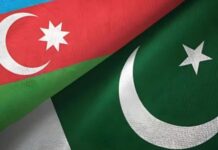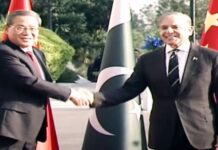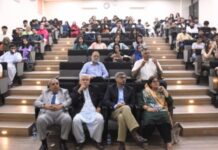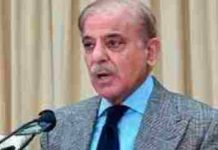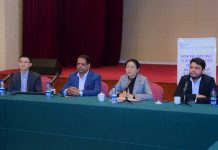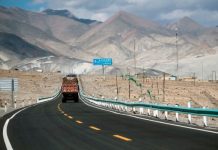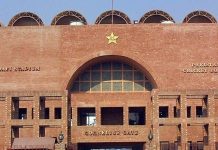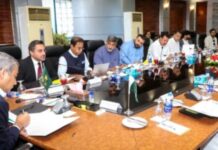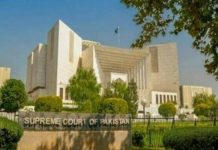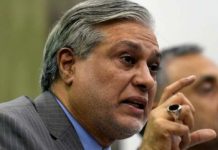NEW YORK, Sep 27 (NNI): Prime Minister Shehbaz Sharif said on Friday a failure to implement United Nations resolutions concerning Palestine had emboldened Israel and it was threatening to drag the entire Middle East into war.
He began his address by reciting verses from the Holy Quran, setting the tone for a call to justice and peace in the Middle East.
“It is an honour for me to address the United Nations General Assembly for the second time as the prime minister of the country that has always been the proactive member of the UN Assembly,” PM Shehbaz said while starting the speech at the 79th Session of the United Nations General Assembly in New York on Friday.
He also spoke about the war in Gaza, India’s ‘occupation’ of Kashmir, Pakistan’s fight against militancy and its struggle to shore up its economy, among other issues.
“In a span of a few days, Israel’s unrelenting bombing of Lebanon, has killed over 500 people, including women, and even small children,” Sharif told the UNGA.
“The failure to implement UN resolutions has emboldened Israel. It threatens to drag the entire Middle East into a war, whose consequences could be grave and beyond imagination.”
Sharif called for “durable peace” through a two-state solution. “We must seek a viable, secure, contiguous and sovereign State of Palestine, based on the pre-1967 borders, with Al-Quds Al-Sharif as its eternal capital. And to advance these goals, Palestine must also be immediately admitted as a full member of the United Nations,” Sharif said.
Sharif also lamented that UN Security Council Resolutions on Jammu and Kashmir had not been implemented. The Council has adopted several resolutions in 1948 and in the 1950s on the dispute between India and Pakistan over the region, including one which says a plebiscite should be held to determine the future of the mostly Muslim Kashmir.
Another resolution also calls upon both sides to “refrain from making any statements and from doing or causing to be done or permitting any acts which might aggravate the situation.”
UN peacekeepers have been deployed since 1949 to observe a ceasefire between India and Pakistan in Jammu and Kashmir.
“Instead of moving toward peace, India has resiled from commitments to implement the Security Council resolutions on Jammu and Kashmir. These resolutions mandate a plebiscite to enable the people of Jammu and Kashmir to exercise their fundamental right to self- determination,” Sharif said.
“Day in and day out, nine hundred thousand Indian troops terrorize the people of occupied Jammu and Kashmir, with draconian measures, including prolonged curfews, extra-judicial killings and the abduction of thousands of young Kashmiris,” Sharif said.
“At the same time, in a classic settler-colonial project, India is seizing Kashmiri lands and properties, and settling outsiders into occupied Jammu and Kashmir, to transform the Muslim- majority into a minority. This hackneyed tactic is employed by all occupying powers, but it has always failed. In Jammu and Kashmir too, it shall fail.”
Sharif said it was also “worrying” that India was engaged in a “massive expansion” of its military capabilities, which were essentially deployed against Pakistan:
The Pakistani leader said that the Kashmir dispute remains a pressing concern on the Security Council’s agenda, with Pakistan advocating for a resolution based on UN resolutions and the will of the Kashmiri people.
He said Pakistan’s founder Quaid-e-Azam Muhammad Ali Jinnah declared that the country stands by the UN resolutions and has stood by this commitment unwaveringly.
Deliberating upon the challenge posed by climate change, Shehbaz Sharif recalled that the catastrophic floods devastated Pakistan two years ago, causing damage of thirty billion dollars.
He pointed out that Pakistan emits less than one percent of global carbon emissions, yet we have paid a heavy price for no fault of ours. He said we must uphold the maxim and the polluter must pay.
The Prime Minister said Pakistan looks forward to the fulfillment of commitments made by development partners to support the achievements of Sustainable Development Goals and climate goals including a new annual goal beyond one hundred billion dollars in climate finance.
PM Sharif acknowledged the difficult decisions taken to restore the economy, which, although caused temporary hardships for the people, have started to bear fruit. He noted that inflation has decreased to a single digit, a significant achievement considering the country’s economic situation.
The premier also expressed optimism about the China-Pakistan Economic Corridor (CPEC), stating it will usher in a new era of development for Pakistan. CPEC is expected to boost economic growth, create jobs, and improve infrastructure.
Turning to national security, PM Sharif emphasized that Pakistan has been battling terrorism for decades, resulting in the loss of over 80,000 civilians and soldiers. He specifically mentioned the heartbreaking massacre of children at the Army Public School (APS).
To combat terrorism, PM Sharif stressed the need for the Afghan government to take decisive action against terrorist groups and prevent cross-border terrorism. He also called for action against other terrorist organizations, including Fitna al-Khawarij.
On the international front, PM Sharif reiterated Pakistan’s commitment to a peaceful resolution of the Ukraine war. Pakistan has maintained a neutral stance, supporting Ukraine’s sovereignty while avoiding criticism of Russia.
The prime minister expressed Pakistan’s commitment, as an incoming member of the UN Security Council for the year 2025-26, to work with all UN Member States to uphold the UN Charter, prevent conflict, foster peace, and promote global prosperity. NNI






